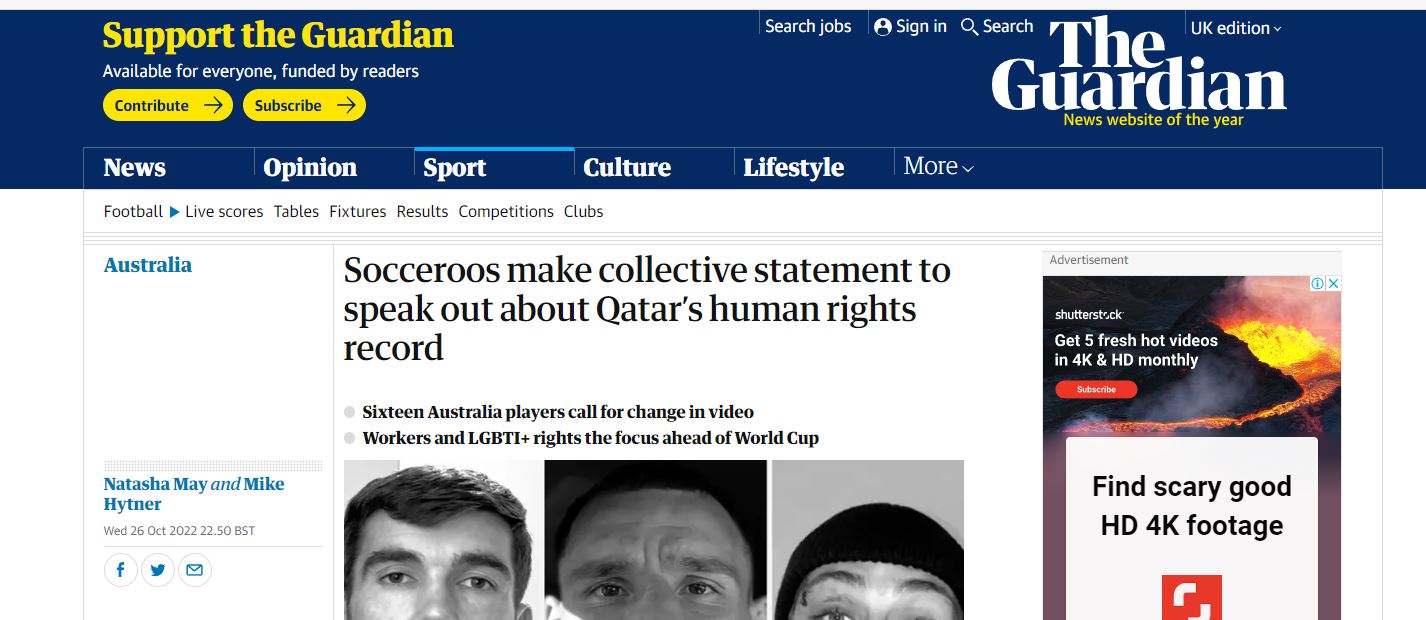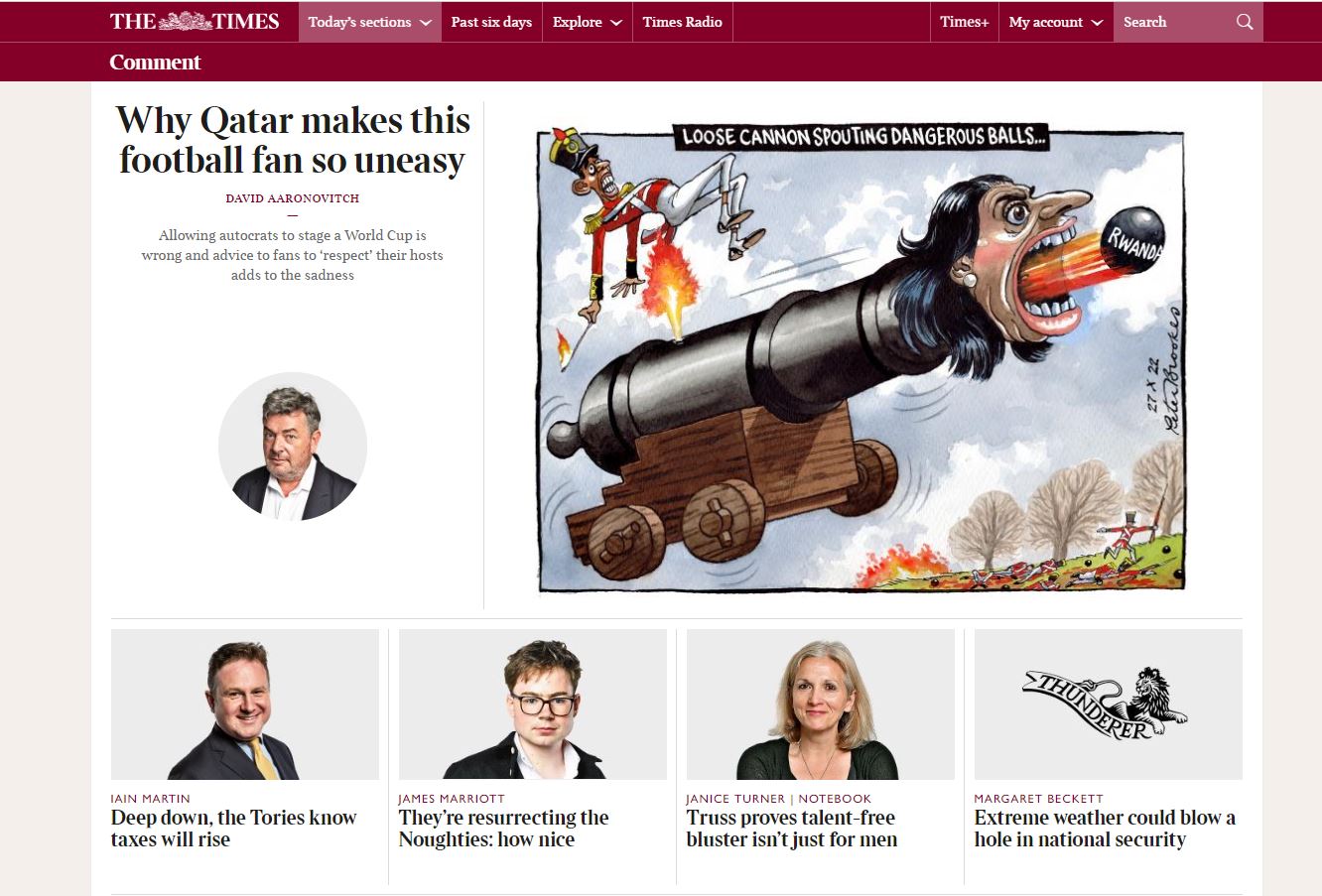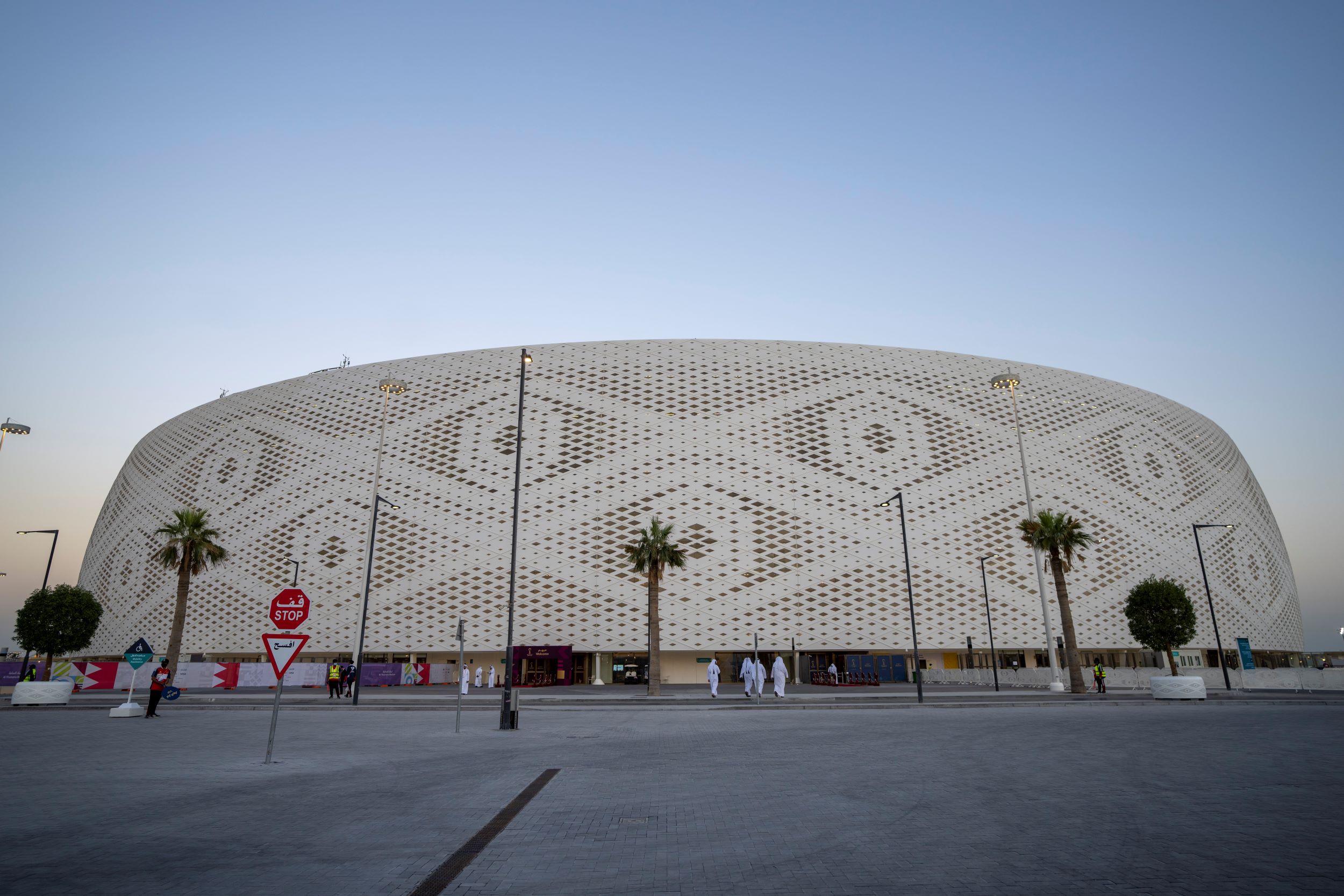مع اقتراب موعد انطلاق مونديال كأس العالم 2022، كان من الحتميّ أن تطفح وسائل إعلام غربية بكم هائل من المقالات التي تنتقد الدولة المضيفة قطر.
"لماذا تثير قطر القلق لدى مشجعي كرة القدم"، هكذا عنون ديفيد آرونوفيتش مقال رأي له نشر في صحيفة التايمز البريطانية مؤخرًا، وأعقبه بالعنوان الفرعي: "إن السماح لدول مستبدة بأن تنظم كأس العالم هو أمر خاطئ، وما يزيد من فداحة هذا الخطأ دعوة الجماهير إلى "احترام" الدولة المضيفة".
لكن لنتخيل أن دولة أخرى، لا تثير مثل هذا الحنق لدى آرونوفيتش، هي التي ستستضيف كأس العالم هذا العام، ولنقل مثلًا إنها الولايات المتحدة. هنا سأعيد صياغة العنوان ليصبح: "لماذا تثير الولايات المتحدة القلق لدى مشجعي كرة القدم. إن السماح لدول عسكرية إمبريالية بأن تنظم كأس العالم أمر خاطئ، وما يزيد من فداحة هذا الخطأ دعوة الجماهير إلى "احترام" الدولة المضيفة."
هل ترون ما فعلته؟ والآن فلتجربوه بأنفسكم. اختاروا أية دولة غربية تخطر ببالكم وانظروا إن كان يمكن إسقاط اسمها على العنوان.

وبعيدًا عن الجدل حول توصيف الولايات المتحدة بأنها "دولة عسكرية إمبريالية"، فإن علينا على الأقل أن نذكر بأنها الدولة التي تشن هجمات صاروخية سرية باستخدام طائرات مسيرة ضمن حدود دول أخرى ليس للولايات المتحدة عليها أية سيادة، كما أنها الدولة التي لديها "قائمة اغتيالات" تتضمن أشخاصا رفضوا السرديات الأمريكية حول تعريف الإرهاب.
إن قائمة الاغتيالات تعني بالأساس تنفيذ عمليات إعدام بلا محاكمة، وهو أمر يفترض أن يكون محرجًا، لاسيما إن كنت تنتقد دولا أخرى بدعوى انتهاكات حقوق الإنسان.
هذه هي الدولة التي يموت السود فيها بوتيرة مقلقة على أيدي رجال الشرطة، وهي التي سعت إلى شرعنة غزو دول مثل العراق وأفغانستان، والتدخلات العسكرية الواسعة في بعض دول أمريكا الجنوبية، بدعوى أنها تحركات تحفظ "الاستقرار والعدالة".
ثم يطلع علينا بعد ذلك "ناشط" في مجال حقوق الإنسان، يدعى بيتر تاتشل، ليدعي أنه اعتقل من قبل الشرطة القطرية بسبب تنظيمه وقفة احتجاجية للدفاع عن حقوق المثليين أمام متحف قطر الوطني في الدوحة، ولكن لحسن الحظ أن بعض وسائل الإعلام الغربية نشرت حقيقة ما حصل، وأن أحدًا لم يعتقله، وإنما طلبت الشرطة منه بكل لباقة أن يتنحى عن الطريق. رغم ذلك، فقد طفحت التغطية الصحفية الغربية بمجملها بازدراء كثيف وواضح وإنكار للقيم السائدة في دولة أخرى تختلف عن تلك السائدة في دولهم.
على الأقل، كان تاتشل منسجما مع مواقفه، إذ إنه تظاهر أيضا قبيل بدء مباريات كأس العالم في روسيا، إلا أن انتقادات الإعلام الغربي لروسيا حينها، وهي من هي فيما يتعلق بانتهاكات حقوق المثليين، كانت باهتة للغاية في العام 2018 مقارنة بما تلقاه قطر اليوم لاستضافتها كأس العالم.
ثم تأتي صحيفة الغارديان لتنشر بحماسة عنوانا عن احتجاج المنتخب الأسترالي ضد قطر. جاء في خبر الغارديان: "لاعبو المنتخب الأسترالي، ومن بينهم قائده مات رايان، أصدروا بيانا جماعيا قويا للاحتجاج على سجل حقوق الإنسان في قطر، وهي الدولة التي تثير الجدل باستضافتها البطولة التي تبدأ الشهر المقبل".

إن استخدام لفظ "تثير الجدل" يعد ضربا مدهشا من الغلو، فإن أردتُ القيام ببعض العمل الشاق، (والذي يعد أمرا استثنائيا هنا) إن أردنا الحديث عن دولة لديها أكثر سياسات الهجرة معاداة للأجانب في العالم، فإن أستراليا لديها سجل حافل ومخزٍ من التعامل الوحشي مع المهاجرين واللاجئين الذين يصلون إلى شواطئها، بل إن الكثيرين منهم يساقون إلى مراكز اعتقال ساحلية نائية ويتركون ليعانوا فيها سنوات عديدة.
لنجرب مجددا أن نعيد صياغة العنوان الذي كتبه ديفيد آرونوفيتش، هل يمكننا ذلك؟ "لماذا تثير أستراليا القلق لدى مشجعي كرة القدم. إن السماح لدول تعامل المهاجرين بوحشية بأن تنظم كأس العالم أمر خاطئ، وما يزيد من فداحة هذا الخطأ دعوة الجماهير إلى "احترام" الدولة المضيفة".
هل يمكنكم تخيل رؤية هذا العنوان في وسائل الإعلام الغربية؟ بالتأكيد لا.
يا ترى كم عدد الدول التي يمكن أن ندرج اسمها في هذا العنوان نفسه؟ أيمكن مثلًا أن نذكر المملكة المتحدة التي تسعى إلى ترحيل اللاجئين والمهاجرين بالجملة إلى رواندا، وهم مكبّلون معًا بالقوة في مقاعدهم؟
لا شك أنه لا يمكن إغفال المفارقة الناتجة عن وضع الرسم الكرتوني هذا بالذات بجانب مقالة آرونوفيتش، أليس كذلك؟

لكن ما يبعث على الحزن هو أنني أعتقد أن الكثيرين في وسائل الإعلام الغربية يغفلونها، وذلك لأن القادة السياسيين الغربيين ووسائل الإعلام التي تتبنى على غير هدى كل ما يصدر عنهم (انظروا مثلا إلى ما حدث في خليج غوانتانامو لتجدوا الدليل القاطع على ذلك)، مقتنعة بشكل كامل أن الطريقة الغربية هي الطريقة الـ"جيدة"، وهذا في الواقع حكم مثير للاشمئزاز وذو نفسٍ استعماري.
وكما أن تعامل الشرطة الأمريكية مع المواطنين السود متجذر بعمق في تاريخ البلاد الحافل بالعنصرية، فإن هذا الموقف من الآخر داخل أيضًا ضمن هذه الحالة العنصرية، والتي يبدو أنها مسكونةٌ بافتراضٍ مسبق بأن الدول الأنجلوأمريكية هي وحدها الجديرة باستضافة كأس العالم.














![Palestinian journalists attempt to connect to the internet using their phones in Rafah on the southern Gaza Strip. [Said Khatib/AFP]](/sites/default/files/ajr/2025/34962UB-highres-1705225575%20Large.jpeg)


























